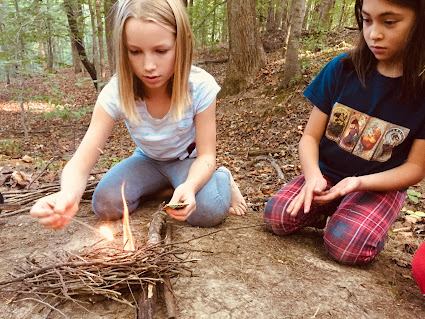Fire & Knives: Kids Need Risky Play
As parents, it's our job to protect our children but at what point do kids need to explore risk taking? Even though we may not always want to admit it, risk is a fact of life. There are hazards all over the place including in our own homes. It's just that some risks we've learned to live with while others continue to terrify us. For example, we're okay having metal forks in the house even though there are electrical outlets too. We've learned how to be safe around electrical outlets through stories and maybe even direct experience 😬.
As a nature mentor who teaches regular outdoor classes for youth I can tell you that the two most popular activities for kids are building a fire and carving with knives. Both of these involve risk as there is definitely a dangerous side to each of these. I often start by telling kids something like "fire can be dangerous. It can get out of control and burn things down" (this gets their attention if I don't have it already and confirms that I'm gonna be real with them). Then I continue, "but it can also help us to live more comfortably. It heats our homes, powers our vehicle engines, and cooks our food. Today, we're going to experience fire in its most pure form. We're going to gather some sticks and build a campfire". At this point their faces beam with excitement.
 |
| Kids ages 9-11 build a campfire and light it on their own. |
What if we didn't lean into risk in this way? What if we avoided these activities and chose not to trust kids with that kind of responsibility? Will they simply stop being interested in fire and knives? Nope. They may just try to do it anyway without proper instruction and learning the safety protocols. When kids come to my classes and learn to use a knife you can see and feel them taking it seriously. Once they've learned the safety protocols they feel that we (adults) trust them with serious responsibility. This is so good for a child.
 |
| Here we see good technique by carving out past his leg so that his body is not in the way of the blade. |
When a child shows interest in something it's best to pursue. Avoidance can create more mystery and intrigue in exploring the subject (sometimes with or without adult supervision). We can help them discover it, learn about it, and experiment with it. If you aren't comfortable in that particular realm then find someone who is. I frequently hear parents say "I'm so glad my kid can come here to learn this stuff because I have no idea how to teach them to do this safely".
It should be said that it can be much harder for parents to teach their own kids these subjects (and others) because of the dynamics. Have you ever seen someone tell your kids something that you've told them a hundred times but this time they really heard it from this other adult? That's what I'm talking about. This is another benefit of aunts & uncles, grandparents, friends, teachers, and Forest School mentors. Sometimes a kid just needs to hear it or learn it from someone else.
Thanks for reading! Leave questions and blog suggestions in the comments section.
Comments
Post a Comment